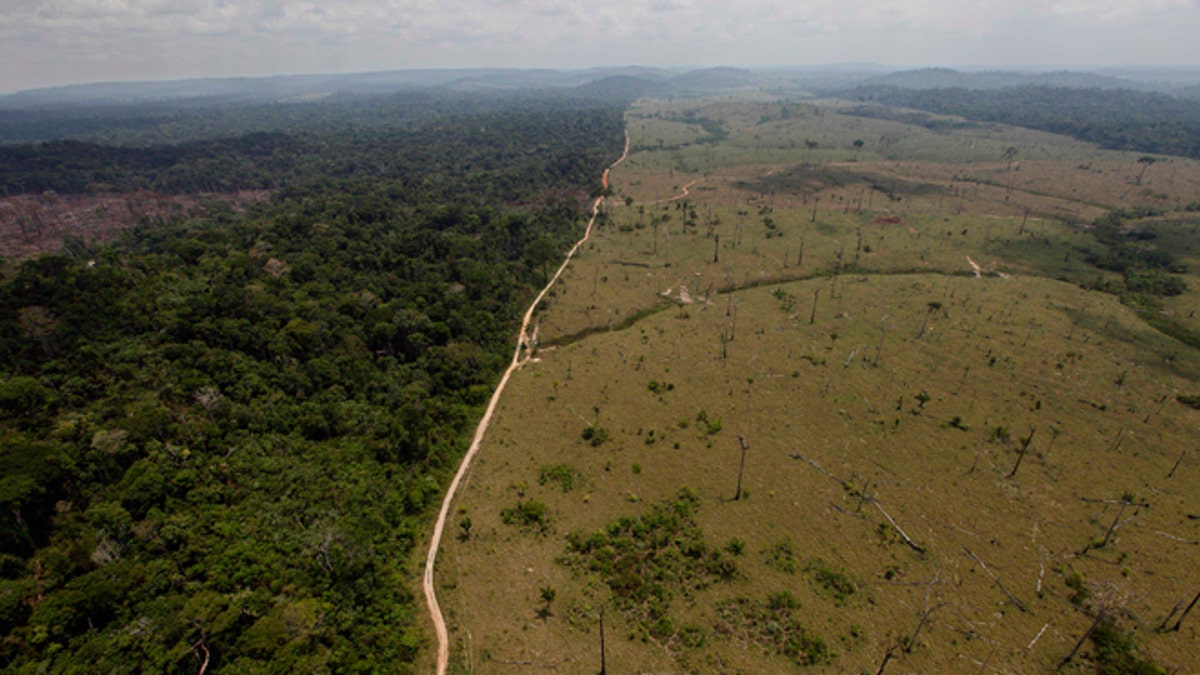
FILE - This Sept. 15, 2009 file photo shows a deforested area near Novo Progresso in Brazil's northern state of Para. Brazil's government says destruction of its Amazon rainforest has jumped by 28 percent. The sharp jump in deforestation came in the August 2012 through July 2013 period, the time when Brazil measures the annual destruction of the forest. (AP Photo/Andre Penner, File) (A2011)
Brazil's government reported on Thursday, Nov. 14, that annual destruction of the Amazon rainforest jumped by 28 percent after four straight years of declines. Environmental activists said the increase was linked to recent loosening of the nation's laws protecting the jungle.
The report came a week after researchers at Princeton University released a study outlining the far-reaching consequences that deforestation in South America could have on agricultural output in the U.S.
According to Environment Minister Izabella Teixeira, 2,256 square miles of rainforest were cut down between August 2012 and July 2013, compared to the 1,765 square miles the previous year. Despite the increase, it was still the second-lowest amount of jungle destroyed since Brazil began tracking the rate of deforestation in 1988.
The Amazon rainforest is considered one of the world's most important natural defenses against global warming because of its capacity to absorb huge amounts of carbon dioxide.
Brazil is the sixth-biggest emitter of the gas. About 75 percent of Brazil's emissions come from rainforest clearing and the burning or rotting of vegetation associated with it. That releases an estimated 400 million tons of carbon dioxide into the atmosphere every year.
The Princeton study, published in the Journal of Climate, said that a completely deforested Amazon could mean 20 percent less rain for the coastal Northwest of the U.S. and a 50 percent reduction in California’s Sierra Nevada snowpack.
"It just so happens that one of the locations feeling that response will be one we care about most agriculturally," said David Medvigy, an assistant professor of geosciences at Princeton. "If you change the snowpack in the Sierra Nevada, where most of the irrigation for California's Central Valley comes from, then by this study deforestation of the Amazon could have serious consequences for the food supply of the United States."
About 20 percent of the Amazon rainforest has been cleared since 1970, but the effects of a completely deforested Amazon are impossible to predict directly.
“We don't know what the world will be like without the Amazon. We know exactly what happens with El Niño — it's been studied extensively," Medvigy said. "Our intention with this paper was to identify an analogy between El Niño and Amazon deforestation. There's good reason to believe there will be strong climatic similarities between the two. Research like this will give us a handle on what to expect from Amazon deforestation."
Environmentalists in Brazil also say that the government's push for big infrastructure projects like dams, roads and railways is pushing deforestation.
A bill revising the Forest Code law passed Congress last year after more than a decade of effort by Brazil’s agricultural lobby to make changes to what has been one of the world's toughest environmental laws.
The new law mostly eased restrictions for landowners with smaller properties, allowing them to clear land closer to riverbanks. Perhaps the most controversial portion was what activists describe as an amnesty allowing those found to have illegally felled land to not face penalties if they sign an agreement to replant trees. A measure many environmentalists see as impossible to enforce.
Paulo Adario, coordinator of Greenpeace's Amazon campaign, said, "The government can't be surprised by this increase in deforestation, given that their own action is what's pushing it... The change in the Forest Code and the resulting amnesty for those who illegally felled the forest sent the message that such crimes have no consequences."
Adario also said the Rousseff government's strong push for infrastructure projects in the Amazon is leading to increased deforestation. Thursday's report showed that much of the destruction was centered along a government-improved roadway running through the states of Pará and Mato Grosso.
Around the world tropical rainforest loss is increasing overall by more than 800 square miles a year, Indonesia, Malaysia, Paraguay, Bolivia, Zambia and Angola leading the deforestation charge.
The Associated contributed to this report.
Follow us on twitter.com/foxnewslatino
Like us at facebook.com/foxnewslatino
